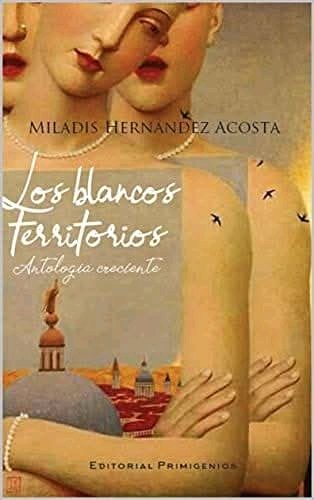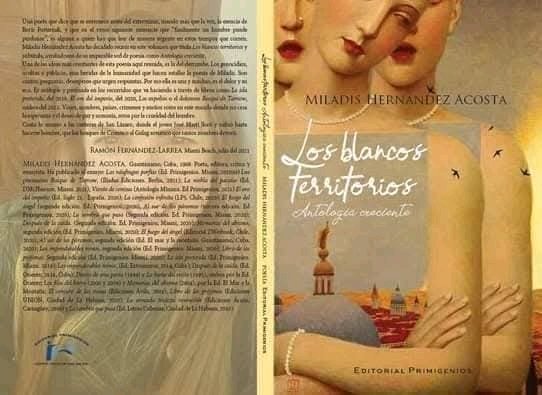MILADIS HERNANDEZ ACOSTA Y LA DESFLORACIÓN DE LOS SIGNOS/MILADIS HERNANDEZ ACOSTA AND THE DEFLOWERING OF SIGNS/(Eng-Esp.)
The distinguished Paraguayan writer Augusto Roa Bastos wrote: "I will teach you the difficult art of the science of writing, which is not, as you think, the art of the flowering of features, but of the deflowering of signs."
Miladis Hernández Acosta (Cuba, 1968) immediately agrees with this statement. She uses it as a shield for seditions in favor of the word. Each sign is vilified, placed at the mercy of the hand that pushes against pain. Each sign is stripped bare, aborts the stretches of light in the depths of disgust, writhes, scorches the blessed toga, is thrown into the open air.
The evidence? The clues? They couldn't be more visible! One need only delve into the thicket of Los blancos territorios: a growing anthology. Magnum book. Fan book. Fortune book. Horizon book. White, too, possesses color, and that is where mystery lies, the perfect rhetoric, the yin and the yang, the albatross and the whistle, the box of hearts. It is there that the whirlwind reconciles with the purple ace, and the woman in blue prays once more for the island, holding the imaginary ball that represents everything, which slumbers on the steaming lime. How then can we be indifferent? How can we turn our heads? How can we not cling to a book that, from its purity, induces us to challenge the wastelands of being?Elie Wiesel famously said: "The duty of the survivor is to bear witness to what happened; to warn people that these things can happen, that evil can be unleashed. Racial hatred, violence, and idolatry still proliferate." Miladis Hernández attests to what she experienced, what she heard, and what she interpreted through her profound hours of study. She is the survivor who fears neither holocausts nor the rampant smoke of murderous tribes. She is the birdseed woman who mocks the intensity of the gallows in each poem.
August Wilson stated: "Confront the dark parts of yourself and work to banish them with enlightenment and forgiveness. Your willingness to wrestle with your demons will cause your angels to sing." A quote that aptly describes Miladis Hernández's reinterpretation of the creative exercise and tropological reordering. In this book, words weigh, fertilize, delimit, and entail the possibility of being discovered in the heights of darkness.
In this book, five more books take refuge, suckle from the mother's udder, receive the slap and the morning bite. Five books seeking purchase from the reader's hunger and thirst. Five books-stages-summaries-autobiographies.
"The Forgotten Island," "The Gold of the Empire," "The Fog of Paradise," "The Forest of Tarnow," and "The Plunderings" are parts of the final or initial architecture, where Miladis Hernández hangs her banners to mark space. They are frameworks of a present knowledgeable of history and human subterfuges, abolished arbitrariness, accumulations of nobility and genuine feelings. There are verses in Los blancos territorios… that reveal the essence of this work: (…) Don't be scared when the shot rings out and I throw myself out the window (…), (…) there are no borders if you have the sea inside you (…), (…) What I wanted or have wanted all my life, if anything, is to feel that at least when it rains something of me is freed, (…) Shooting is an adventitious fact (…) or For the umpteenth time, destruction (…)
In this book, words reappear like actors on stage: surprisingly, faithful to the applause of those who see and hear them. They appear like darts, like stalactites, like golden metal springs. They appear from the coherence of an innate connoisseur of the arts: Miladis Hernández. They appear to persuade, to link the forked paths. This book contains as many virtues as there are weighty words: the use of paratexts, the dynamics of poetic discourse, the fragmentation of verses in each poem, to name just a few. Virtues that give the work added value, a heightening, a different connotation.
The White Territories: A Growing Anthology reaffirms what Gretel Ehrlich said: "Islands are reminders of arrivals and departures," or what Francis Daniels Moore wrote: "The brain is an island in an osmotically homogeneous sea."
This work could be presented to the world as a great etymological reliquary. It could be presented as a surprising current of sea or land, ready to conquer the unusual. In Miladis Hernández Acosta's quest to approach literary perfection, several names assault my mind, dominate my thoughts. Names that, like gold ingots, shine in the body of the word: Idea Vilariño, Nina Gagen-Torn, Kamal Das Suraiya, Elizabeth Bishop, María Mercé Marçal, Saint Teresa of Jesus, Emilia Pardo Bazán, Gloria Fuertes, Gabriela Mistral, and María Elena Walsh. I know that this book-knocker-helmet-fence-chrysanthemum will receive the inaugural applause of eternity, because that is the author's intention.


El destacado escritor paraguayo, Augusto Roa Bastos, escribió: "Te enseñaré el difícil arte de la ciencia escritural, que no es, como crees, el arte de la floración de los rasgos, sino de la desfloración de los signos".
Miladis Hernández Acosta (Cuba, 1968) se suma de inmediato a esta sentencia. La toma como escudo para sediciones a favor de la palabra. Cada signo es vilipendiado, puesto a merced de la mano que empuja contra el dolor. Cada signo se desnuda, aborta los tramos de luz en la profundidad del asco, se retuerce, chamusca la toga bendita, se arroja a la intemperie.
¿Las pruebas? ¿Los indicios? ¡Más visibles no pueden estar! Basta con adentrarse en la espesura de Los blancos territorios: antología creciente. Libro-magno. Libro-abanico. Libro-fortuna. Libro-horizonte. También lo blanco posee color, y es ahí donde radica el misterio, la retórica perfecta, el ying y el yang, el albatros y el pitido, la caja de corazones. Es ahí donde de la tromba se reconcilia con el as púrpura, y la mujer de azul reza una vez más por la isla, sosteniendo la bola imaginaria que lo presiente todo, que se aletarga sobre la cal humeante. ¿Cómo entonces ser indiferente? ¿Cómo voltear la cabeza? ¿Cómo no aferrarse a un libro que nos induce desde la pulcritud a desafiar los páramos del ser?
Oportunamente, Elie Wiesel dijo: "El deber del superviviente es dar testimonio de lo que ocurrió, hay que advertir a la gente de que estas cosas pueden suceder, que el mal puede desencadenarse. El odio racial, la violencia y la idolatría todavía proliferan". Miladis Hernández da fe de lo vivido, de lo escuchado, de lo interpretado, mediante sus profundas horas de estudio. Es la sobreviviente que no teme a los holocaustos, ni al humo desenfrenado de las tribus asesinas. Es la mujer-alpiste que burla en cada poema la intensidad de la horca.
August Wilson afirmó: "Confronta las partes oscuras de ti mismo y trabaja para desterrarlas con iluminación y perdón. Tu disposición a luchar con tus demonios provocará que tus ángeles canten". Cita que describe atinadamente la reinterpretación que hace Miladis Hernández del ejercicio creativo y del reordenamiento tropológico. En este libro las palabras pesan, fecundan, delimitan, entrañan la posibilidad de ser descubiertas en lo alto de la penumbra.
En este libro, cinco libros más se refugian, se amamantan de la ubre madre, reciben el pescozón y la mordida mañanera. Cinco libros buscando asidero desde el hambre y la sed del lector. Cinco libros-etapas-resúmenes-autobiografías.
"La isla preterida", "El oro del imperio", "La niebla del paraíso", "El bosque de Tárnow" y "Los expolios", son partes de la arquitectura final o inicial, donde Miladis Hernández cuelga sus banderas para marcar espacio. Son entramados de un presente conocedor de la historia y los subterfugios humanos, abolidas arbitrariedades, cúmulos de nobleza y sentimientos genuinos.
Hay versos en Los blancos territorios…que develan la esencia de esta obra: (…) No se asusten cuando suene el tiro y yo me lance por la ventanilla (…), (…) no hay frontera si tienes el mar adentro (…), (…) Lo que quise o he querido toda mi vida si acaso es sentir que al menos cuando llueve algo de mí se libera, (…) Disparar es un hecho adventicio (…) o Por enésima vez la destrucción (…)
En este libro las palabras reaparecen como actores en escena: sorpresivamente, fieles a la ovación de quienes las ven y escuchan. Aparecen como dardos, como estalactitas, como muelles de metal dorado. Aparecen desde la coherencia de una conocedora innata de las artes: Miladis Hernández. Aparecen para persuadir, para vincular los caminos bifurcados.
Hay en este libro tantas virtudes aglomeradas, como palabras de peso: el uso de paratextos, la dinámica del discurso poético, la fragmentación de los versos en cada poema, por solo citar algunas. Virtudes que le dan a la obra un valor añadido, un realce, otra connotación.
Los blancos territorios: antología creciente, reafirma lo dicho por Gretel Ehrlich: "Las islas son recordatorios de llegadas y salidas", o lo escrito por Francis Daniels Moore: "El cerebro es una isla en un mar osmóticamente homogéneo".
Esta obra pudiera presentase al mundo como un gran relicario etimológico. Pudiera presentarse como una sorpresiva corriente de mar o tierra, dispuesta a conquistar lo inusitado. En el afán de Miladis Hernández Acosta, por acercarse a la perfección literaria, varios nombres asaltan mi cabeza, dominan mi pensamiento. Nombres que, como lingotes de oro, resplandecen en el cuerpo de la palabra: Idea Vilariño, Nina Gagen-Torn, Kamal Das Suraiya, Elizabeth Bishop, María Mercé Marçal, Santa Teresa de Jesús, Emilia Pardo Bazán, Gloria Fuertes, Gabriela Mistral y María Elena Walsh.
Sé que este libro-aldabón-casco-verja-crisantemo, recibirá el aplauso inaugural de la eternidad, porque la intención de la autora, es esa.
Texto: propiedad del autor de la reseña
Imágenes: Eduardo René Casanova Ealo